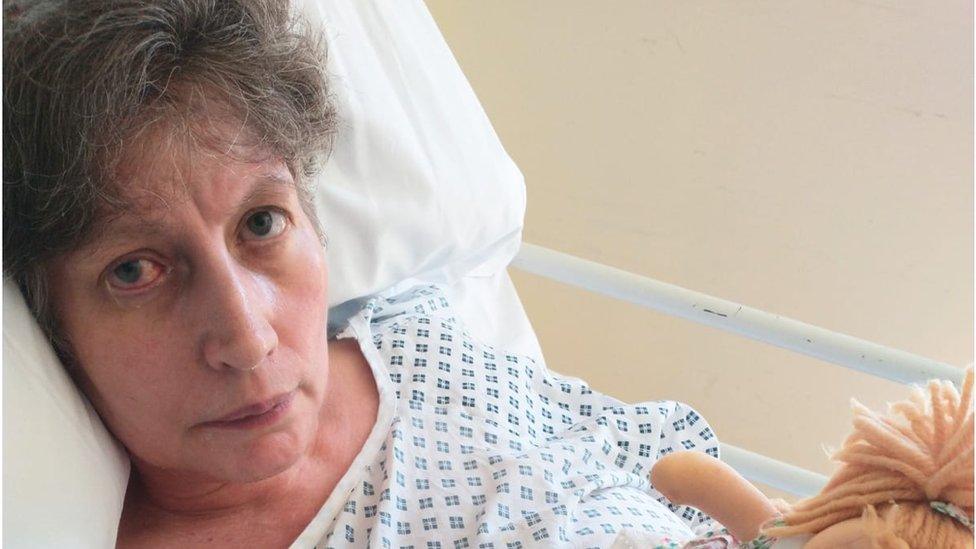NHS: Woman waited nine months for hospital discharge
- Published

Sylvia Hubbard, right, with her daughter Jocelyn
A woman who spent nine months in hospital waiting for a suitable care home placement became a "shadow of her former self", her mother has said.
Jocelyn Ullmer, 60, from West Sussex, saw her health deteriorate after being admitted to hospital in June last year.
Her mother, Sylvia Hubbard, 86, said: "We tried to get her out of hospital, but no-one wanted her."
Across England, around 60% of patients classed as fit to leave remain in hospital at the end of an average day.
Figures show the biggest obstacle is a lack of beds in other settings, such as care homes and community hospitals.
The government said it was investing £1.6bn over the next two years to help improve the situation.
'Went completely mute'

Jocelyn Ullmer spent nine months in hospital before a place was found for her in Southampton
Ms Ullmer was taken to Queen Alexandra Hospital in Portsmouth with a urinary tract infection in June 2022.
The 60-year-old, who has autism, had been living at a high needs care home in Fareham, Hampshire.
At hospital, she found herself on a general ward, surrounded by people with mixed needs - some of whom were dying.
Despite an unsuccessful attempt to move her to a care home in October last year, she was passed between various hospital wards for nine months.
"She didn't really get the specialist learning support that is required for someone like Jocelyn," said her mother.
"She was bedbound, she wasn't encouraged to get out of bed and feed herself - and she lost the ability to talk. She went completely mute.
"We tried to get her out of hospital, but no-one wanted her."
Despite weekly meetings, where hospital staff and social workers discussed possible care plans for patients, there were no suitable beds available at any specialist care facilities within West Sussex.
Ms Ullmer was eventually found a home in Southampton earlier in 2023 and has begun to talk again.
But the effects of that nine-month stay have been profound. During her time in hospital, she also tested positive for Covid-19 and strep-B, a potentially life-threatening infection.
"She won't sit up very much because she's so used to lying down," her mother said. "She's very, very anxious, she keeps saying, 'Is this my home? Am I staying here?' She needs constant reassurance.
"She's a shadow of her former self in all respects."
Ms Hubbard says she has no complaints with the hospital staff who looked after her daughter and believes the social workers at Sussex County Council tried their best to find a placement.
A spokesperson for the council said: "Like the rest of the country, our health and social care system is under significant pressure. We are faced with increasing demand for our services, but with a limited number of places available that can offer the necessary level of care required by people with complex needs."
Your device may not support this visualisation
With NHS pressures set to hit a winter peak, the BBC Shared Data Unit analysed the proportion of people who faced a delayed discharge at every hospital in the country over the latest 12-month period.
On an average day in England, almost 60% of all patients eligible to leave hospital did not do so between July 2022 and June 2023 - increasing to nearly 70% on Sundays.
Figures show a lack of available social care packages in the local authority area was behind almost half of all those delayed discharges - often referred to as "bed blocking".
Reasons for NHS hospital discharge delays revealed
£500m funding to help hospitals discharge patients
One in six patients should not be in hospital
Man died in hospital after waiting months to leave
Three trusts were unable to discharge more than 90% of patients on an average day. All were in the North West of England.
Among them, Stockport NHS Foundation Trust had five days where not one patient was discharged.
A spokesman for the trust said the area had a "significantly higher population of older people than in other areas of Greater Manchester," who were more likely to have complex health issues.
Stockport Council, which oversees social care in the area, said tackling the issue of delayed discharges was a "key priority".
Chief of operations at Northern Care Alliance, Jude Adams, said: "Increasing pressures across the health and social care system can mean that some of our patients will end up staying in hospital longer than they need to."
A spokeswoman for Liverpool University Hospitals NHS Foundation Trust said it was one of the largest trusts in the country and experienced high demand.
"We are working extremely hard with local partners in community and adult social care to ensure patients are safely discharged in a timely manner," she said.
'Persistent understaffing'
The Department for Health and Social Care (DHSC) said it was investing a record £1.6bn into tackling delayed discharges over the next two years.
This will be given to both leaders of NHS Integrated Care Boards and councils to find the "most effective" way to free up hospital beds. Some of the funds can be used to recruit social workers.
Last year, among a series of funding packages, the NHS was given £200m to create "step-down" wards for those awaiting a care package to start or for home adaptions to be made. These are staffed by a mix of nurses, carers and occupational therapists.
The NHS has already rolled out 10,000 virtual ward beds, ahead of winter, to help patients be cared for in their own homes where possible.
But Patricia Marquis, director for England at the Royal College of Nursing (RCN), believes social care needs a recruitment drive on a similar scale to the £50bn NHS Long Term Workforce Plan, external, announced by Prime Minister Rishi Sunak in June.
She said: "At the heart of this is persistent understaffing across all care settings."
Caroline Abrahams, director of the charity Age UK, said more older people would spend longer in hospital than necessary unless the government could "pay care professionals more - not just over the winter but as part of their basic pay".
A spokesman for health think tank the Nuffield Trust said the funding aimed at improving discharge delays provided "short-term clarity" for local councils but fell short of the reform needed.
"These delays are indicative of significant issues in the care sector fuelled by years of underinvestment, staff shortages and an unstable provider market," he added.
Across the UK
The study found delayed hospital discharges caused by a lack of care staff were not specific to England.
In Scotland, a lack of availability in the care system made up 70% of all reasons given for a delay.
In Wales, figures for delays are measured differently, but a snapshot in August suggests around 1,570 were waiting to leave hospital, down from around 1,750 in April when post-pandemic data, external started to be gathered again.
There was no comparable data in Northern Ireland.

Have you been affected by the issues raised in this story? Share your experiences by emailing haveyoursay@bbc.co.uk, external.
Please include a contact number if you are willing to speak to a BBC journalist. You can also get in touch in the following ways:
WhatsApp: +44 7756 165803
Tweet: @BBC_HaveYourSay, external
Please read our terms & conditions and privacy policy
If you are reading this page and can't see the form you will need to visit the mobile version of the BBC website to submit your question or comment or you can email us at HaveYourSay@bbc.co.uk, external. Please include your name, age and location with any submission.
More about this story

The Shared Data Unit makes data journalism available to news organisations across the media industry, as part of a partnership between the BBC and the News Media Association.
For more information on the methodology and full dataset, click here, external. Read more about the Local News Partnerships here.